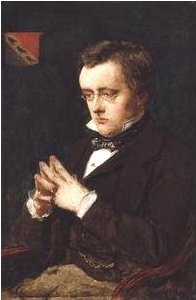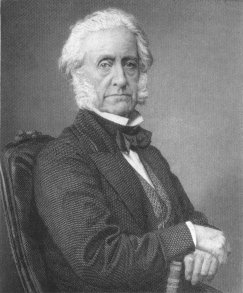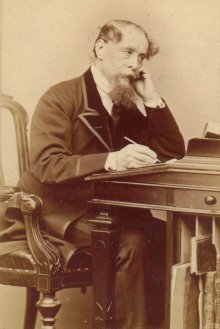1852 was an important year for the young Wilkie Collins. As the year began, his first Christmas book,
Mr Wray's Cash-Box; or, the Mask and the
Mystery, had been in the shops two weeks. In January, he began writing his second set of pieces for the radical weekly
The Leader. Called 'Magnetic Evenings at
Home', they were a series of essays about clairvoyance and mesmerism in the form of letters to the paper's editor George Henry Lewes, probably based on a Christmas visit to Weston-super-Mare. In April, he wrote his first piece for Dickens's weekly
Household Words. It was the start of a professional relationship which lasted more than ten years and covered the time when Wilkie moved from being an unknown and small-time writer to being one of the giants of his age. He went on to write for 100 issues of
Household Words and continued with its successor All The Year
Round.
His first story for Household Words turned out to be one of his most popular. Published on 24 April 1852
'A Terribly Strange Bed' was a horror story which Wilkie later said was based on a true event, or at least one told to him as true. It has remained a popular tale to the present day, frequently included in anthologies and dramatised for radio in the UK and America, and for television. He was paid £7-10s for it.
Wilkie Collins by Sir John Everett Millais,
1850.
Oil on panel, 10.5 in. x 7 in. (267 mm x 178 mm).
The portrait is currently on display at the National Portrait Gallery.
This image is courtesy of the National
Portrait Gallery which holds the copyright in it and forbids
reproduction in any form without permission.
Richard Bentley - published Basil
Collins had met Dickens the year before when he was asked to act in a Bulwer Lytton play
Not So Bad as we Seem. In 1852 the production was taken on tour, visiting several English cities including Manchester, Bath, Birmingham and Bristol.
But the most important event of the year for Collins was the publication of his first significant novel.
Basil: A Story of Modern Life was his third published novel after the Roman adventure
Antonina (1850) and the short
Mr Wray's Cash-Box. But Basil was the first full length novel set in the present day and containing the elements of sex and violence which were to become the hall mark of the sensation novel. He spent most of the year writing it, finally finishing the story in September while staying in Dover with Dickens who was himself writing
Bleak House. He delivered the manuscript to the publisher Richard Bentley on 1 October and it was published on 16 November.
At the proof stage Wilkie toned down one scene, where the hero visits a seedy hotel and hears through a partition wall his wife making love
with another man. Originally, the hotel was a brothel and the porter a prostitute.
Despite the change, the critics were appalled. One called it "a tale of criminality, almost revolting from its domestic horrors. The vicious atmosphere in which the drama of the tale is enveloped, weighs on us like a nightmare. The jail, the gibbet, and the madhouse are the accessories of the story:- the adultery of a wife, the jealous torture of the injured husband, the ferocious thirst for revenge of the detected paramour are its themes!"
(D O Maddyn in The Athenaeum 4 December 1852 pp1322-1333)
The public however bought it, and Dickens pronounced it a success. He wrote to Collins "…the story contains admirable writing and…a very delicate discrimination of character…I have made Basil's acquaintance with great gratification…And I hope that I shall become intimate with many worthy descendants of his, who are yet in the limbo of creatures waiting to be born." (Dickens to Collins, 20 December 1852).
On Dickens's advice, Collins demanded - and got - £350 for Basil
selling the whole copyright to Bentley. Two years later, with sales of fiction hit by the Crimean war, Bentley offered to sell the rights to
Basil and Antonina back to Wilkie for £200. On 10 July 1854 Wilkie replied "In the present state of my resources, I cannot afford to part with £200".
This image of Dickens was taken by Gurney & Son of New York in 1867/68.


